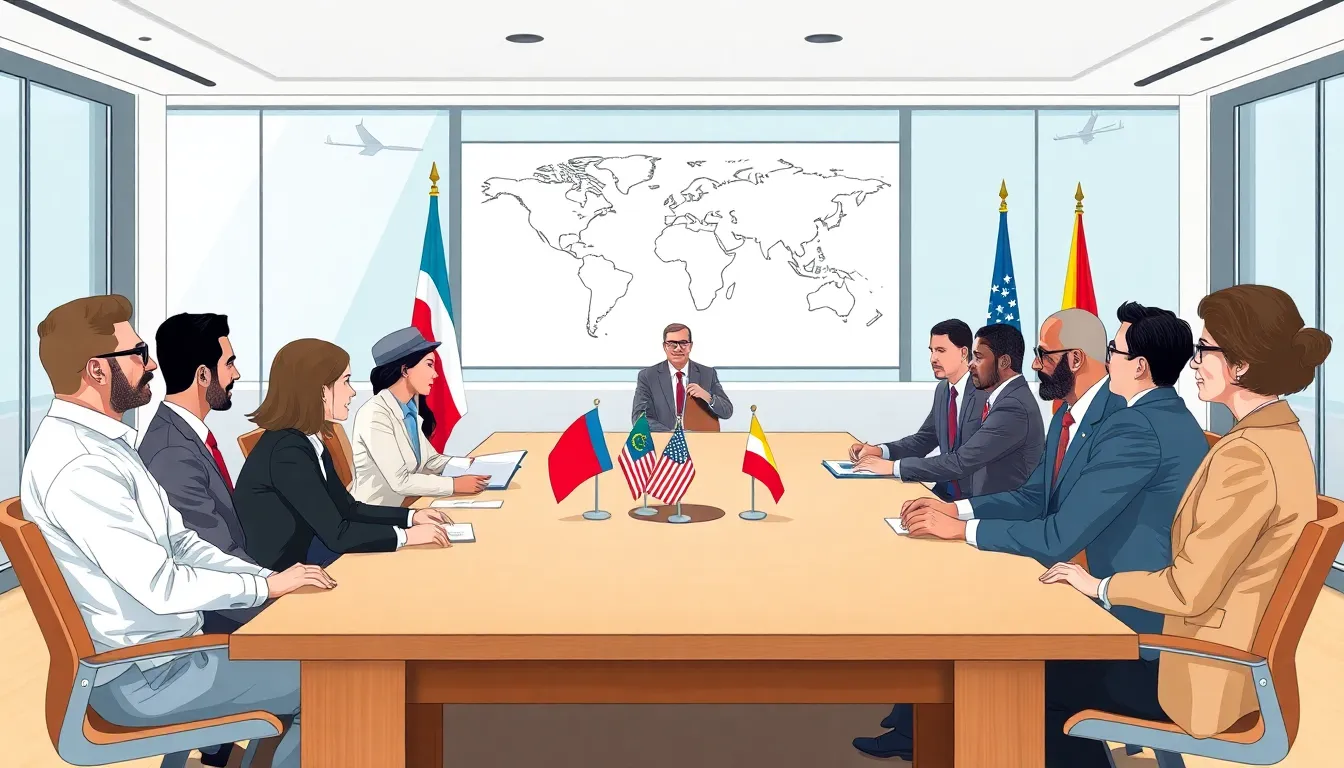Table of Contents
ToggleIn a world where borders blur and alliances shift faster than a cat meme goes viral, understanding the impact of international relations is crucial. It’s not just about treaties and trade deals; it’s about how nations influence each other, for better or worse. From global warming to economic crises, the ripple effects of international decisions can turn a peaceful afternoon into a geopolitical rollercoaster.
So why should anyone care? Because the decisions made in distant capitals can affect everything from the price of coffee to the latest TikTok trends. By grasping the nuances of international relations, one can navigate this complex landscape with the finesse of a diplomat and the wit of a stand-up comic. Buckle up as we dive into the fascinating world of international relations and uncover how it shapes our everyday lives.
Overview of International Relations Impact
Understanding international relations reveals its extensive influence on diverse aspects of life. Economic stability often fluctuates due to international agreements, affecting local markets and job availability. Trade policies shape the prices of goods, which can alter consumer behavior. Political alliances impact national security, guiding foreign policy decisions and military strategies.
Cultural exchanges become more prevalent through diplomacy, leading to the globalization of ideas and traditions. Educational opportunities increase as nations collaborate on research and academic programs. Environmental policies also take shape within the international framework, influencing how countries address climate change and resource management.
Everyday experiences reflect the outcomes of these global interactions. Individuals encounter cultural diversity and international products in their communities. Migration patterns arise from political unrest or economic opportunities, reshaping demographics and societal norms.
Additionally, global crises like pandemics or natural disasters require coordinated responses, underscoring the interconnectedness of nations. International relations play a crucial role in humanitarian efforts and development goals. Countries work together to combat issues such as poverty, health crises, and conflict resolution, directly impacting communities worldwide.
International relations serve as a vital ecosystem influencing economies, cultures, security, and societal well-being. Each facet interacts with another, creating a complex web that defines contemporary life. Recognizing these dynamics fosters greater awareness and adaptability in an ever-evolving world.
Historical Context

Understanding the historical context of international relations reveals its significant evolution over time. Major events and influential theories have shaped the landscape today.
Major Events Shaping International Relations
World War I and World War II fundamentally transformed global interactions. The Cold War period introduced a new level of geopolitical tension, while the establishment of the United Nations promoted international cooperation. The fall of the Berlin Wall symbolized the end of East-West divisions. Significant regional conflicts, such as the Gulf War and the Balkan Wars, highlighted the complexities of international alliances. The rise of globalization in the late 20th century created an interconnected marketplace, leading to economic interdependence among nations. Events such as the 9/11 attacks triggered extensive changes in security policies and international cooperation on counter-terrorism.
Key Theories in International Relations
Realism emphasizes power dynamics and state interests in international relations. States prioritize survival and often act in self-interest. Liberalism, contrastingly, focuses on cooperation and the potential for mutual benefit through international organizations. Constructivism examines how social constructs and identities shape global interactions. Each theory illustrates different aspects of international relations, influencing policy decisions and diplomatic strategies. Understanding these theories helps analyze complex diplomatic behavior and predict reactions in global scenarios. They form the framework for interpreting international events and interactions.
Economic Implications
International relations significantly shape economic landscapes, influencing trade, investment, and market stability.
Trade Relations
Trade policies directly affect the flow of goods and services between countries. Agreements like free trade deals often lead to increased export and import activity, resulting in greater economic growth. For instance, the North American Free Trade Agreement (NAFTA) boosted trade between the U.S., Canada, and Mexico. Tariffs can also impact consumer prices, altering purchasing behavior. Countries engaging in strategic partnerships benefit from lowered trade barriers and enhanced market access. Industries reliant on global supply chains face fluctuations due to geopolitical tensions, which can disrupt production. Thus, understanding trade relations offers insight into economic opportunities and risks.
Globalization Effects
Globalization affects economic interactions by fostering interdependence among nations. It encourages businesses to expand internationally, leading to capital flow and investment opportunities. Economies become more integrated, allowing for greater access to diverse markets. Labor markets often experience shifts, as jobs may move to lower-cost countries. Cultural exchange under globalization enriches consumer choices but may also impact local economies. Multinational corporations play a prominent role, shaping trends and practices around the world. Awareness of these dynamics helps individuals and businesses adapt strategies to compete effectively in a global context.
Political Consequences
Political consequences of international relations manifest through shifting alliances and power structures. Nations position themselves strategically, influencing global stability and security.
Power Dynamics
Power dynamics dictate interactions among states, as stronger nations often set the agenda. Economic prowess and military strength become pivotal factors in these relationships. Additionally, emerging economies challenge established powers, redistributing influence. These shifts create a need for adaptable policies and strategies. Increased competition can prompt alliances and rivalries, shaping the geopolitical landscape.
Conflict and Cooperation
Conflict and cooperation coexist within international relations, balancing national interests with global goals. Conflicts arise from territorial disputes, resource competition, and ideological differences. However, nations also seek cooperation through diplomacy and multilateral agreements. Collaborative efforts address challenges like climate change, trade, and security threats. Ultimately, successful negotiations enhance stability and foster mutual benefits in a complex world.
Social and Cultural Effects
International relations have notable social and cultural effects that shape global interactions and individual lives. These dynamics reveal the interconnectedness of societies, influencing everything from lifestyle choices to cultural practices.
Cross-Cultural Influence
Globalization fosters cross-cultural influence, allowing diverse traditions to intermingle. Cultural exchanges occur through various channels, such as education, tourism, and media. Students studying abroad gain exposure to different belief systems and practices, enriching their perspectives. Movies and music transcend borders, providing common ground and shared experiences. When individuals embrace foreign customs, it promotes understanding and acceptance among different cultures. Importantly, this interaction encourages mutual respect, as people learn to appreciate different heritages while strengthening global ties.
Public Perception of International Relations
Public perception plays a crucial role in shaping the narrative around international relations. Media coverage significantly impacts how individuals understand foreign policies and global events. News outlets often highlight conflicts or humanitarian crises, influencing opinions about specific countries or international organizations. Social media platforms amplify voices, allowing grassroots movements to emerge and change public sentiment. As people engage in discussions about global issues, their perceptions of nations evolve, shaping diplomatic relations. Increased public awareness aids in fostering empathy and encouraging active participation in global dialogue.
Understanding international relations is essential in today’s interconnected world. The complexities of global interactions shape economies, cultures, and security in profound ways. Individuals who grasp these dynamics can navigate the challenges and opportunities presented by shifting alliances and policies.
As nations continue to engage in diplomacy and collaboration, the impact of international relations will only grow. By fostering awareness and adaptability, people can play a role in shaping a more stable and cooperative global environment. The interplay of historical context, economic implications, and cultural exchanges highlights the significance of international relations in everyday life. Embracing this knowledge empowers individuals to contribute positively to global discourse and development.




